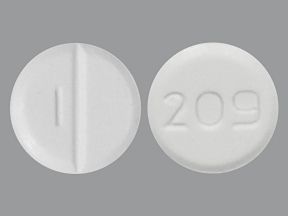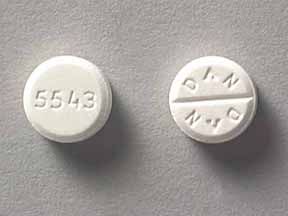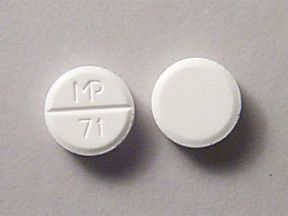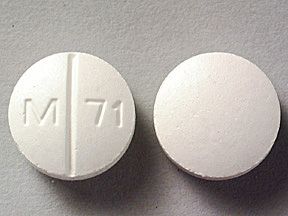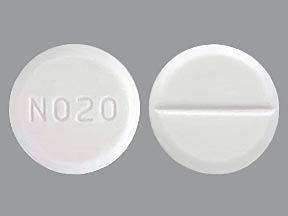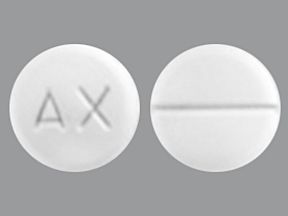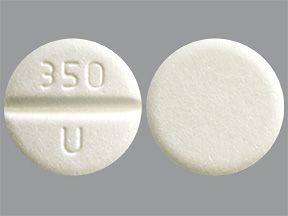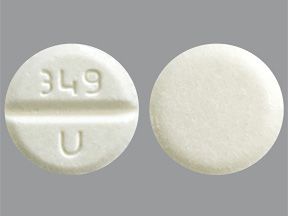Highlights for allopurinol
- Allopurinol oral tablet is available as a generic drug and as brand-name drugs. Brand names: Zyloprim and Lopurin.
- Allopurinol is also given as an injection by a healthcare professional in the hospital.
- Allopurinol oral tablet is used to treat gout, elevated serum uric acid levels, and recurrent kidney stones.
- Severe skin rash: This drug may cause a severe, life-threatening skin rash. If you have itchiness, trouble breathing, or swelling of your face or throat, stop taking this drug and call your doctor right away.
- Liver injury: This drug may cause changes in liver function test results and liver failure. This may be fatal. If you develop liver problems, your doctor may have you stop taking allopurinol.
- Drowsiness: This drug can cause drowsiness. You shouldn’t drive, use machinery, or do other tasks that require alertness until you know how it affects you.
- Fluid intake: You should drink at least 3.4 liters (14 cups) of fluids each day. This will help you urinate at least 2 liters (2 quarts) per day. This can help prevent uric acid crystals from forming and blocking your urine flow. Ask your doctor how to measure how much you urinate.
Allopurinol oral tablet is a prescription drug that’s available as the brand-name drugs Zyloprim and Lopurin. It’s also available as a generic drug. Generic drugs usually cost less. In some cases, they may not be available in every strength or form as the brand-name version.
Allopurinol also comes in an intravenous (IV) form, which is only given by a healthcare professional.
Allopurinol may be used as part of a combination therapy. This means you may need to take it with other medications.
Why it’s used
Allopurinol is used to decrease uric acid levels in the blood and urine of people with high uric acid levels. High uric acid levels may be caused by the following:
- gout
- kidney stones, kidney damage, or treatment with dialysis
- cancer chemotherapy
- psoriasis
- use of diuretics (water pills)
- a diet high in soft drinks, beef, steak, salami, or beer
How it works
Allopurinol belongs to a class of drugs called xanthine oxidase inhibitors. A class of drugs is a group of medications that work in a similar way. These drugs are often used to treat similar conditions.
Allopurinol decreases blood and urine uric acid levels by blocking xanthine oxidase. This is an enzyme that helps make uric acid. High levels of uric acid in your blood or urine can cause gout or kidney stones.
Allopurinol oral tablet may cause drowsiness. You shouldn’t drive, use machinery, or do other tasks that require alertness until you know how allopurinol affects you. It can also cause other side effects.
More common side effects
The more common side effects of allopurinol oral tablet can include:
- skin rash
- diarrhea
- nausea
- changes in your liver function test results
- gout flare-up (if you have gout)
If you develop a skin rash, talk your doctor right away. You should not continue taking allopurinol if you develop a rash. Other mild side effects may go away within a few days or a couple of weeks. If they’re more severe or don’t go away, talk with your doctor or pharmacist.
Serious side effects
Call your doctor right away if you have serious side effects. Call 911 if your symptoms feel life-threatening or if you think you’re having a medical emergency. Serious side effects and their symptoms can include the following:
- Severe skin rash. Symptoms can include:
- itchy hives (raised bumps on your skin)
- red or purple-colored spots on your skin
- scaly skin
- fever
- chills
- trouble breathing
- swelling of your face or throat
- Liver injury. Symptoms can include:
- tiredness
- lack of appetite
- weight loss
- right upper abdominal area pain or discomfort
- jaundice (dark-colored urine or yellowing of your skin or the whites of your eyes)
Disclaimer: Our goal is to provide you with the most relevant and current information. However, because drugs affect each person differently, we cannot guarantee that this information includes all possible side effects. This information is not a substitute for medical advice. Always discuss possible side effects with a healthcare professional who knows your medical history.
Allopurinol oral tablet can interact with other medications, vitamins, or herbs you may be taking. An interaction is when a substance changes the way a drug works. This can be harmful or prevent the drug from working well.
To help avoid interactions, your doctor should manage all of your medications carefully. Be sure to tell your doctor about all medications, vitamins, or herbs you’re taking. To find out how this drug might interact with something else you’re taking, talk with your doctor or pharmacist.
Interactions that increase your risk of side effects
- Side effects from allopurinol: Taking allopurinol with certain medications raises your risk of side effects from allopurinol. This is because the amount of allopurinol in your body is increased. Examples of these drugs include:
- Ampicillin or amoxicillin. You may have an increased risk of a skin rash.
- Thiazide diuretics, such as hydrochlorothiazide. You may have an increased risk of allopurinol side effects. These include skin rash, diarrhea, nausea, changes in your liver function test results, and gout flare-ups.
- Side effects from other drugs: Taking allopurinol with certain medications raises your risk of side effects from these drugs. Examples of these drugs include:
- Mercaptopurine. Allopurinol can increase the blood levels of mercaptopurine in your body. It does this by blocking one of the enzymes used to break down mercaptopurine. This can cause severe side effects from mercaptopurine. Your doctor may reduce your mercaptopurine dose.
- Azathioprine. Allopurinol can increase the blood levels of azathioprine in your body. It does this by blocking one of the enzymes used to break down azathioprine. This can cause severe side effects from azathioprine. Your doctor may reduce your azathioprine dosage.
- Cyclosporine. Taking allopurinol with cyclosporine may increase cyclosporine levels in your body. Your doctor should monitor your cyclosporine levels and adjust your dose if needed.
Disclaimer: Our goal is to provide you with the most relevant and current information. However, because drugs interact differently in each person, we cannot guarantee that this information includes all possible interactions. This information is not a substitute for medical advice. Always speak with your healthcare professional about possible interactions with all prescription drugs, vitamins, herbs and supplements, and over-the-counter drugs that you are taking.
This drug comes with several warnings.
Allergy warning
Allopurinol can cause a severe allergic reaction. Symptoms can include:
- itchy hives (raised bumps on your skin)
- red or purple-colored spots on your skin
- scaly skin
- fever
- chills
- trouble breathing
- swelling of your face or throat
If you have an allergic reaction, call your doctor or local poison control center right away. If your symptoms are severe, call 911 or go to the nearest emergency room. Don’t take this drug again if you’ve ever had an allergic reaction to it. Taking it again could be fatal (cause death).
When to call your doctor
Call your doctor if your gout symptoms get worse while you’re taking this drug. When you first start taking this medication, it can cause your gout to flare up. Your doctor may give you nonsteroidal anti-inflammatory drugs (NSAIDs) or colchicine to treat the flare-up and prevent more flares. You may need to take these drugs for up to 6 months.
Warnings for certain groups
For people with kidney problems: If you have kidney problems or a history of kidney disease, you may not be able to clear this drug from your body well. This may increase the levels of allopurinol in your body and cause more side effects. This medication may also decrease your kidney function. This would make your kidney disease worse.
For pregnant women: Allopurinol is a category C pregnancy drug. That means two things:
- Research in animals has shown adverse effects to the fetus when the mother takes the drug.
- There haven’t been enough studies done in humans to be certain how the drug might affect the fetus.
Talk with your doctor if you’re pregnant or planning to become pregnant. This drug should only be used if the potential benefit justifies the potential risk to the fetus.
For women who are breastfeeding: Allopurinol passes into breast milk and may cause side effects in a child who is breastfed. Talk with your doctor if you breastfeed your child. You may need to decide whether to stop breastfeeding or stop taking this medication.
For seniors: The kidneys of older adults may not work as well as they used to. This can cause your body to process drugs more slowly. As a result, more of a drug stays in your body for a longer time. This raises your risk of side effects.
For children: This medication hasn’t been studied and shouldn’t be used in people younger than 18 years for the treatment of gout or kidney stones.
This dosage information is for allopurinol oral tablet. All possible dosages and drug forms may not be included here. Your dosage, drug form, and how often you take the drug will depend on:
- your age
- the condition being treated
- how severe your condition is
- other medical conditions you have
- how you react to the first dose
Forms and strengths
Generic: Allopurinol
- Form: oral tablet
- Strengths: 100 mg, 300 mg
Brand: Zyloprim
- Form: oral tablet
- Strengths: 100 mg, 300 mg
Brand: Lopurin
- Form: oral tablet
- Strengths: 100 mg, 300 mg
Dosage for gout
Adult dosage (ages 18–64 years)
- Typical starting dose: 100 mg per day
- Dose adjustments: Your doctor may increase your dose by 100 mg per week until you’ve reached the desired level of serum uric acid.
- Usual dose:
- Mild gout: 200–300 mg per day
- Moderate to severe gout: 400–600 mg per day
- Maximum dose: 800 mg per day taken in divided doses
Child dosage (ages 0–17 years)
This medication hasn’t been studied and shouldn’t be used in people younger than 18 years for this condition.
Senior dosage (ages 65 years and older)
The kidneys of older adults may not work as well as they used to. This can cause your body to process drugs more slowly. As a result, more of a drug stays in your body for a longer time. This raises your risk of side effects.
Your doctor may start you on a lowered dose or a different dosing schedule. This can help keep levels of this drug from building up too much in your body.
Special considerations
- For people with kidney disease: Depending on how well your kidneys are working, your doctor will lower your dosage. Your doctor will decide your dosage based on your creatinine clearance. This is a measure of your kidney function.
Dosage for elevated serum uric acid levels due to cancer treatments
Adult dosage (ages 18–64 years)
600–800 mg per day for 2 or 3 days.
Child dosage (ages 11–17 years)
600–800 mg per day for 2 or 3 days
Child dosage (ages 6–10 years)
300 mg per day. Your doctor will adjust your dose as needed based on your serum uric acid level.
Child dosage (ages 0–5 years)
150 mg per day. Your doctor will adjust your child’s dose as needed based on your serum uric acid level.
Senior dosage (ages 65 years and older)
The kidneys of older adults may not work as well as they used to. This can cause your body to process drugs more slowly. As a result, more of a drug stays in your body for a longer time. This raises your risk of side effects.
Your doctor may start you on a lowered dose or a different dosing schedule. This can help keep levels of this drug from building up too much in your body.
Special considerations
- For people with kidney disease: Depending on how well your kidneys are working, your doctor will lower your dose. Your doctor will decide your dosage based on your creatinine clearance. This is a test that measures your kidney function.
Dosage for recurrent kidney stones
Adult dosage (ages 18–64 years)
Typical dosage is 200–300 mg per day taken in a single or divided doses.
Child dosage (ages 0–17 years)
This medication hasn’t been studied and shouldn’t be used in people younger than 18 years for this condition.
Senior dosage (ages 65 years and older)
The kidneys of older adults may not work as well as they used to. This can cause your body to process drugs more slowly. As a result, more of a drug stays in your body for a longer time. This raises your risk of side effects.
Your doctor may start you on a lowered dose or a different dosing schedule. This can help keep levels of this drug from building up too much in your body.
Special considerations
- For people with kidney disease: Depending on how well your kidneys are working, your doctor will lower your dose. Your doctor will decide your dosage based on your creatinine clearance. This is a test that measures your kidney function.
Disclaimer: Our goal is to provide you with the most relevant and current information. However, because drugs affect each person differently, we cannot guarantee that this list includes all possible dosages. This information is not a substitute for medical advice. Always to speak with your doctor or pharmacist about dosages that are right for you.
Allopurinol oral tablet is used for long-term treatment. It comes with serious risks if you don’t take it as prescribed.
If you stop taking the drug suddenly or don’t take it at all: The uric acid levels in your blood or urine will stay high. If you have gout or kidney stones, you’ll still have symptoms of your condition.
If you miss doses or don’t take the drug on schedule: Your medication may not work as well or may stop working completely. For this drug to work well, a certain amount needs to be in your body at all times.
If you take too much: You could have dangerous levels of the drug in your body. Symptoms can include:
- skin rash
- diarrhea
- nausea
- changes in your liver function test results
- gout flare-up (if you have gout)
If you think you’ve taken too much of this drug, call your doctor or local poison control center. If your symptoms are severe, call 911 or go to the nearest emergency room right away.
What to do if you miss a dose: Take your dose as soon as you remember. But if you remember just a few hours before your next scheduled dose, take only one dose. Never try to catch up by taking two doses at once. This could result in dangerous side effects.
How to tell if the drug is working: Your doctor will test your uric acid levels to check if this drug is working. Your blood uric acid levels will decrease about 1–3 weeks after you start taking this drug. Your doctor will also ask you about how much fluids you drink and how much fluids you urinate.
Right after you start taking this drug, you may have gout flares. Over time, your symptoms of gout may start to go away.
Keep these considerations in mind if your doctor prescribes allopurinol oral tablet for you.
General
- Take this drug at the time(s) recommended by your doctor.
- You can take allopurinol with or without food.
- Taking this drug after a meal and with lots of water may reduce your chance of upset stomach.
- You can cut or crush the allopurinol tablet.
- Not every pharmacy stocks this drug. When filling your prescription, be sure to call ahead to make sure your pharmacy carries it.
Storage
- Store allopurinol at room temperature. Keep it between 68°F and 77°F (20°C and 25°C).
- Keep it away from light.
- Don’t store this medication in moist or damp areas, such as bathrooms.
Refills
A prescription for this medication is refillable. You should not need a new prescription for this medication to be refilled. Your doctor will write the number of refills authorized on your prescription.
Travel
When traveling with your medication:
- Always carry your medication with you. When flying, never put it into a checked bag. Keep it in your carry-on bag.
- Don’t worry about airport X-ray machines. They can’t hurt your medication.
- You may need to show airport staff the pharmacy label for your medication. Always carry the original prescription-labeled box with you.
- Don’t put this medication in your car’s glove compartment or leave it in the car. Be sure to avoid doing this when the weather is very hot or very cold.
Clinical monitoring
You and your doctor should monitor certain health issues. This can help make sure you stay safe while you take this drug. These issues include:
- Kidney function. Your doctor may do blood tests to check how well your kidneys are working. If your kidneys aren’t working well, your doctor may lower your dose of this drug.
- Liver function. Your doctor may do blood tests to check how well your liver is working. If your liver isn’t working well, your doctor may lower your dose of this drug.
- Uric acid levels. Your doctor may do blood tests to check your uric acid. This will help your doctor tell how well this drug is working.
Your diet
If you have repeat kidney stones, your doctor may tell you to eat a special diet. This diet will be low in animal protein (meat), sodium, sugar, and oxalate-rich foods (such as, spinach, beets, celery, and green beans).
Your diet should also be high in fiber, and you should drink plenty of water. You may also need to watch your calcium intake.
There are other drugs available to treat your condition. Some may be better suited for you than others. Talk with your doctor about other drug options that may work for you.
Disclaimer: Healthline has made every effort to make certain that all information is factually correct, comprehensive, and up-to-date. However, this article should not be used as a substitute for the knowledge and expertise of a licensed healthcare professional. You should always consult your doctor or other healthcare professional before taking any medication. The drug information contained herein is subject to change and is not intended to cover all possible uses, directions, precautions, warnings, drug interactions, allergic reactions, or adverse effects. The absence of warnings or other information for a given drug does not indicate that the drug or drug combination is safe, effective, or appropriate for all patients or all specific uses.

